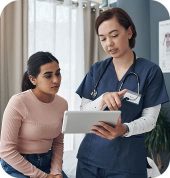From reproductive health to wellness, find your voice and connect with others in this women’s health circle.
This is more than just a health page; it’s a community. Our women’s health circle is a space where Black and brown women can connect, support each other, and find the strength to navigate their health journeys. We understand the unique challenges and experiences that shape our health, and we’re here to provide a safe and empowering environment for all.
Learn about Tiffany’s pregnancy journey and the questions that impacted her and her baby’s health.
When it comes to our health, these four affect our community the most:

The journey to motherhood should be a time of joy and anticipation, but for many in underrepresented communities, it’s often met with increased risk and significant challenges. Women in our communities experience higher rates of pregnancy-related complications, from preeclampsia to gestational diabetes, as well as a lack of culturally-competent care. However, hearing the experiences of others can be a powerful source of strength and inspiration.

Polycystic ovary syndrome (PCOS) is a hormonal disorder that affects many women, but its impact can be particularly significant in underrepresented communities. PCOS can lead to a range of symptoms, including irregular periods, excess androgen levels (which can cause acne and hair growth), and problems with fertility.

Endometriosis is a chronic (long-term) and often painful condition where tissue similar to the lining of the uterus grows outside of it. While it affects women of all backgrounds, its impact can be particularly significant within underrepresented communities due to delayed diagnosis and lack of research.

Premenstrual dysphoric disorder (PMDD) is a severe form of premenstrual syndrome (PMS) that can significantly impact a woman’s mood, physical health, and overall well-being. While PMDD affects women across all demographics, its experience and management are important to consider within underrepresented communities as it often carries a stigma in many cultures.
When we are not included in clinical research, we can’t be sure if a treatment will work just as well or be just as safe for us as it will for other races.
By participating in clinical research, we can give ourselves a chance to have treatments that may work better and be safer for us.
Learning more about clinical research can be a critical step in improving health outcomes for future generations.
If you still have questions, you are not alone.
NOWINCLUDED is a community created for us, by us to:
Join the community built to improve our health.
Copyright 2025. NOWINCLUDED | Privacy Policy | Terms of Service
Over 100K community members across the US are making a difference in their health. Are you ready to take action?
